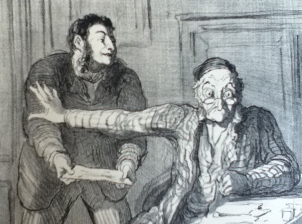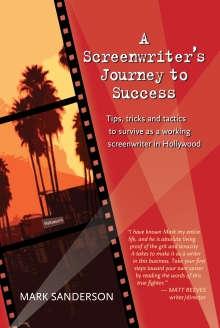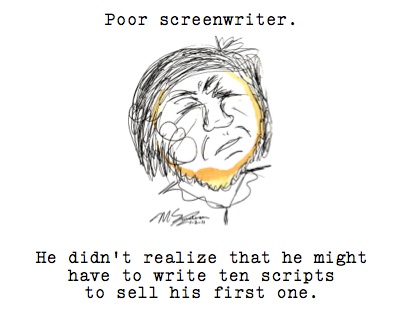 After we submit our script to someone for a read, we go through the “waiting game.” It’s that horrible period when the lack of any reply can fester inside a screenwriter’s head, and the fear of rejection and failure can fuel negative thoughts. We get enough rejection on our journey, so why create more anxiety for ourselves during the period when someone reads our script as we wait for them to get back to us, right? We have no control over when they will respond or even their response. Hopefully, we’ve done our best work in the script and what is on the page now it represents us without any excuses. It’s a process you will repeat over your entire career.
After we submit our script to someone for a read, we go through the “waiting game.” It’s that horrible period when the lack of any reply can fester inside a screenwriter’s head, and the fear of rejection and failure can fuel negative thoughts. We get enough rejection on our journey, so why create more anxiety for ourselves during the period when someone reads our script as we wait for them to get back to us, right? We have no control over when they will respond or even their response. Hopefully, we’ve done our best work in the script and what is on the page now it represents us without any excuses. It’s a process you will repeat over your entire career.
Many times, I’ve learned that no news is just that—no news. I’ve conjured us horrible scenarios only to be proven wrong when the good news comes. As creative people, we screenwriters can imagine all kinds of unknown situations in our head, writing, filming, and editing the outcome before it happens. That’s destructive thinking and wasted energy. The way to get through this period after you submit your script to an agent, manager, production company, executive, or contest is to stay busy. It’s vital to your mental state over the long haul. Even when you do forge a career, you will submit projects to your producers or executives so it never ends. It’s how you treat the waiting period that counts and staying in control is vital to your mental survival
 It helps to always stay busy with some form of writing. While your script is out and you await a response, you need to create other projects, new loglines, pitches, treatments, and work on a new screenplay. When you are busy, you won’t be obsessed with waiting for a response for those projects out in the marketplace. When the good or bad news trickles in, you won’t be destroyed by the comments or rejection because you will be too busy on your new screenplay. You open up new opportunities with every screenplay that you create. It’s vital to your creative soul to keep pressing forward and filling new blank pages.
It helps to always stay busy with some form of writing. While your script is out and you await a response, you need to create other projects, new loglines, pitches, treatments, and work on a new screenplay. When you are busy, you won’t be obsessed with waiting for a response for those projects out in the marketplace. When the good or bad news trickles in, you won’t be destroyed by the comments or rejection because you will be too busy on your new screenplay. You open up new opportunities with every screenplay that you create. It’s vital to your creative soul to keep pressing forward and filling new blank pages.
 While you are experiencing the waiting game, it helps to remember that Hollywood works on its own timetable. It’s a time warp where nothing happens as fast as you’d like and sometimes it feels like even a few steps forward takes too long. Time can burn so quickly as you pursue your screenwriting career in Hollywood. You spend so much time and energy finishing your script, once you finish how can you temper your excitement? This is what we live for as screenwriters—the excitement of completing a new project. It’s playing the game, living as a wide-eyed dreamer with hope for another chance up to the plate. It’s empowering to work on your own schedule and steer your own ship seemingly in control of your destiny.
While you are experiencing the waiting game, it helps to remember that Hollywood works on its own timetable. It’s a time warp where nothing happens as fast as you’d like and sometimes it feels like even a few steps forward takes too long. Time can burn so quickly as you pursue your screenwriting career in Hollywood. You spend so much time and energy finishing your script, once you finish how can you temper your excitement? This is what we live for as screenwriters—the excitement of completing a new project. It’s playing the game, living as a wide-eyed dreamer with hope for another chance up to the plate. It’s empowering to work on your own schedule and steer your own ship seemingly in control of your destiny.
Remember, your script is the most important thing in the world to you—but you quickly discover it’s not to everyone else. This is when a time warp happens and your reality quickly shows down to Hollywood’s schedule. It’s a strange world of fear, unknowns, half-truths, promises, good intentions, and a very long slog. Again, it helps to stay busy and working on your next great screenplay.
 Even if you do land a screenplay assignment, the business side of negotiation takes time. On one assignment job, my contract for a script assignment went back and forth between my lawyer and the production company’s lawyer for a month. As negotiations continue on every deal point, the back and forth seemingly takes forever—and this is before you can start any work on the script. Unfortunately, a holiday comes up, so it means another four or five days until a reply and new draft of the contract. It seems like torture, feeling as if you’re in the starting blocks waiting for the starter gun to go off—but it never does until you and the producer sign the contract’s final draft. This is when it helps to have patience my fellow screenwriters—learn patience. It’s a big part of the life of a screenwriter and will help on your long haul journey.
Even if you do land a screenplay assignment, the business side of negotiation takes time. On one assignment job, my contract for a script assignment went back and forth between my lawyer and the production company’s lawyer for a month. As negotiations continue on every deal point, the back and forth seemingly takes forever—and this is before you can start any work on the script. Unfortunately, a holiday comes up, so it means another four or five days until a reply and new draft of the contract. It seems like torture, feeling as if you’re in the starting blocks waiting for the starter gun to go off—but it never does until you and the producer sign the contract’s final draft. This is when it helps to have patience my fellow screenwriters—learn patience. It’s a big part of the life of a screenwriter and will help on your long haul journey.
The key to surviving the “waiting game” is to empower yourself by staying busy writing. As you create a new project, the energy comes from your mind as you drive your dreams forward with your passion for storytelling. Don’t give into fear during the waiting game because that’s what it wants you to do. If you don’t hear back within your artificially created deadline, fear might creep into your creative soul and you will easily believe that you are a horrible writer if you don’t receive feedback. Avoid this destructive habit by staying busy during this period. You’re onto your next project and too busy to worry about what happens with the last. That’s empowering and puts you back in control.
Keep the faith and keep writing because if you stop, you’re guaranteed to never have any shot at success. And trust me this is a business where there are no guarantees—even when you do sell a screenplay.
Scriptcat out!
Copyright 2016 by Mark Sanderson on My Blank Page.
Did you just complete your latest screenplay and need in-depth consultation? Check out my services by clicking on the blue icon below for the link to my website.
Do you need a guide to help navigate your screenwriting journey in Hollywood’s trenches? Check out my new book, “A Screenwriter’s Journey to Success” now available on Amazon. It chronicles my past twenty years screenwriting professionally in Hollywood using my tips, tricks and tactics that have helped me stay in the game. Click on the book cover for the link to Amazon.
Need a check list to help reach your screenwriting goals? Try my on-demand webinars. Click on the icon below for the link to buy or rent.
Check out my Coffee Ring Cartoons Merchandise for screenwriters. Click on the photo below for the link to my online store.
No, it’s not a very good story – its author was too busy listening to other voices to listen as closely as he should have to the one coming from inside.” — Stephen King
“The single most important question, I think, that one must ask one’s self about a character is what are they really afraid of? What are they really afraid of? And if you ask that question, it’s probably for me the single best way of getting into a character. That finally is where stories are told… with a character that’s real.”—Robert Towne
“The professional understands delayed gratification. He is the ant, not the grasshopper; the tortoise, not the hare… the professional arms himself with patience, not only to give the stars time to align in his career, but to keep himself from flaming out in each individual work. He knows that any job, whether it’s a novel or a kitchen remodel, takes twice as long as he thinks and costs twice as much. He accepts that. He recognizes it as reality. He conserves his energy. He prepares his mind for the long haul. He sustains himself with the knowledge that if he can just keep the huskies mushing, sooner or later the sled will pull in to Nome.” — Steven Pressfield, “The War of Art”





